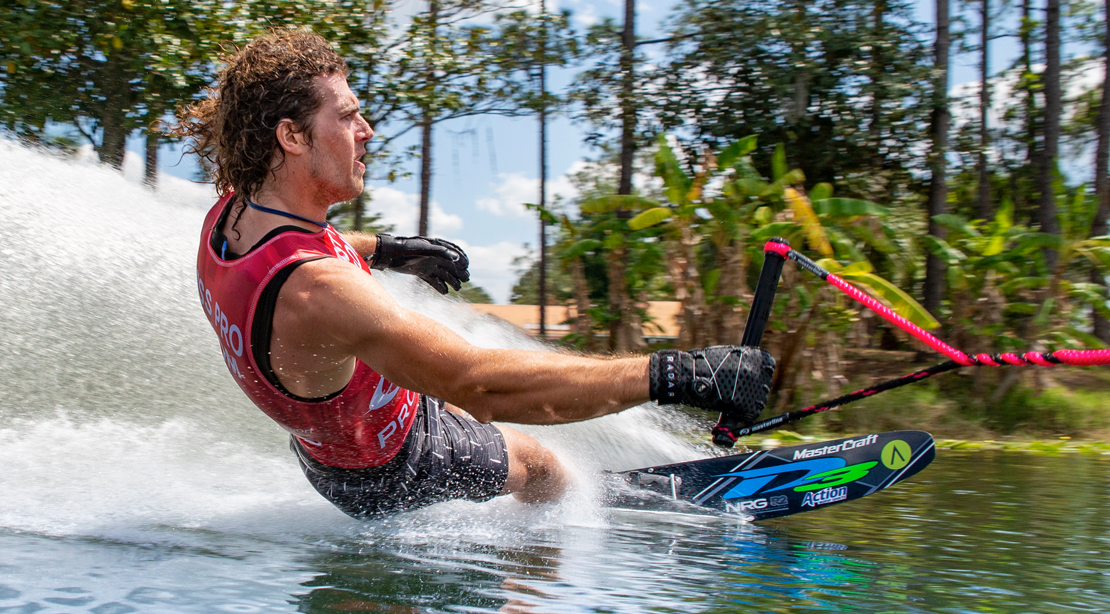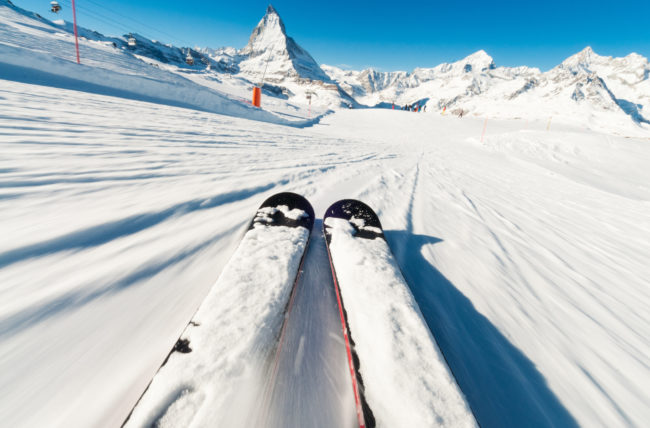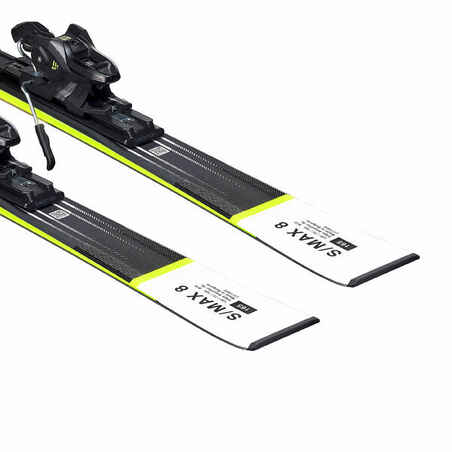
Alpine skiing is one of most exciting events at the Winter Olympics. There are five different events. Two are technical, while the three remaining are speed events. Medals can be awarded in both men's and women's events at the Olympics.
Alpine skiing is a sport where you slide down a snow-covered mountain slope with skis that have fixed-heel attachments. Each year, the FIS World Cup Alpine Skiing takes place in different locations. After the race, the winner is crowned and receives a crystal trophy.
Slalom is the most common course in alpine skiing. Super-G is the other. Super-G was designed for speed and is different from downhill. The athlete must complete the course within a time limit and must pass through a series gate. They must remain within the course's borders, with the exception in a few instances.
The longest of the three races, the downhill course, is also the longest. The downhill course is the longest and requires 130 km/h. Each competitor can only take one ski down it. The fastest skier is declared winner at the end.

The super-G course mixes downhill and slalom. Similar to downhill, the gates are spaced more closely. This course also features a steeper vertical drop. The vertical drop of the slope should be between 400 to 650m for men and between 450 to 800 meters for women.
Alain Alcott enjoyed a strong preseason in Chile. He scored points in four disciplines during 2020-21 season. He hopes to compete in five different events. His goal is to win medals across all five. He's already scoring high results in the preseason.
Mikaela Siffrin will be the favourite to win a slalom silver medal. She has won gold at three World Championships in the event. Her speed, handling of icy terrain, and knowledge of the course should help her. But her ability to succeed in other disciplines may also be the difference in a silver or bronze.
Other alpine skiing events include giant slalom and ski cross. In addition to the slalom, there is a mixed team competition. Teams are knocked out after each round, with the fastest skier winning the combined.
There are many individual medals available. Nicola RountreeWilliams was last year's second fastest U-18 in the giant slalom. Jessie Diggins is the Mass Start Skate silver medalist and has won two individual Cross-Country Ski medals. Noah Bowman placed fifth in men's halfpipe both in 2014 and 2018. Tess Coady received the bronze medal in slopestyle for women.

Bode Miller has been awarded five Olympic medals. He's also had a great career on the World Cup. He's now back with the US ski team, even though he has had some issues at the Olympics. He used to be a Ted Ligety teammate.
He was a consistent podium finisher in 2010 and 2011. However, he's had a flop on the world's biggest stage the past two Games.
FAQ
What size luggage should I carry?
The amount of luggage you take depends on the length of your trip. If you are traveling by plane, you only need hand baggage, usually less than 20kg. If you are traveling by plane, you only need hand baggage, usually less than 20kg.
A form will be provided to you when you arrive at the airport with information about your flight. This will include information such a weight of your bags, and whether you need assistance with checking them in.
Before you leave for work, make sure to check it. If you don’t check it, you might end up waiting hours for everyone else to do so.
It is best to travel light because you never know what might happen. For instance, if your bag is lost or stolen, you won’t have any clothes.
What should you do first when you arrive at your destination?
It is a good idea to have a plan for when you get to a destination. It helps you know what to expect and where to go next.
It is important to plan ahead so you don't forget anything.
You should also research what museums, parks, or landmarks you want to visit if you are planning to visit a city more than once.
A map of the area may be useful and you might want to read up on the history.
What should I do with my luggage?
There are many options. The most popular option is to use lockers in airports. These are typically located near the security zone. These lockers cost $5-10 per day depending on their size.
Another option is to rent a storage unit. These units are often located in large shopping centers or hotels. Although prices vary, some places offer discounts for multiple units that are rented together.
The third option is to rent a porter. You can hire a porter to help you carry your bags from the carousel to the room. Each time he assists you, a small fee will be charged.
What snacks can I bring on the plane?
You have many options for snacks to take with you when flying. You might consider bringing along any food items you enjoy while traveling.
You might pack chocolates or other sweet treats, such as crisps, biscuits, and nuts.
If you're looking for something savory, perhaps you could try packing some cheese or crackers.
It's also worth considering what kind of beverages you'd prefer to have aboard. Perhaps you like hot or cold beverages?
Whatever kind of snack or drink that you choose to bring along with you, make sure everything is packed securely.
This will ensure that your belongings are safe during transport.
How can I travel light?
There are many options when it comes to packing for a trip. Here are some tips that will help you make the right choice when packing for your next trip.
-
Bring only what you really need.
-
Pack only what you'll actually wear.
-
Avoid buying too many things.
-
Be sure to have plenty of space in your suitcase
-
Always double-check to make sure that everything is in your bag.
-
Make use of the free storage facilities
-
Use reusable water bottles instead of buying bottled water.
-
Carry a backpack instead of using a suitcase.
-
When possible, walk or cycle instead of taking public transport.
-
Pick the right size bag
-
Do not carry heavy items.
-
You should be prepared for every eventuality
-
Do not leave anything behind
You should not forget these things when you travel.
You will find yourself in situations that leave you with very little time for making decisions when you travel. You should be ready to improvise.
You could be stuck there for hours, days and even weeks. If you plan ahead you can have food and water, shelter, and a place for sleep. But, if not, you might have the need to improvise.
In these cases, you'll probably have to rely on what you know how to do best. That means making quick decisions based on instinct and experience.
Sometimes, however, you will not have any other choice. For example, you could be stranded in an area without cell phone service, running out of gas, or having been robbed. You'll need to adapt quickly to these situations.
Keep calm, be focused, and take action. Don't panic. Instead, be calm and focus on what you can do.
For example, if you're lost in the woods, you can choose which direction to go. If you are hungry, you can eat mushrooms or berries. Rainwater or melting snow are good options if you're feeling thirsty.
If you are tired, you can take a break. It's okay to bundle up if it is cold. You can wear a sweater if it's cold. Whatever your choice, staying positive will help you feel better.
Which countries have the best cuisine?
Different countries have different cuisines. It is difficult to know which countries are best at cooking.
But we can show you which countries serve the best food!
According to TripAdvisor users:
-
Italy - Italy is voted number one by TripAdvisor users due to its delicious food.
-
France – France was ranked 2nd because of its rich cultural and culinary heritage.
-
Spain – Spain came third due to its wonderful weather and beautiful beaches.
Statistics
- Between the ages of 11 and 13, kids, or tweens, will likely want some autonomy but also need boundaries. (travelandleisure.com)
- Alcoholic beverages with more than 24% but not more than 70% alcohol are limited in checked bags to 5 liters (1.3 gallons) per passenger and must be in unopened retail packaging. (tsa.gov)
- That's an 18% jump from 2019, the previous record year. (travelandleisure.com)
- Case in point: the private island of Ilha Caldeira, less than seven miles off the coast as part of the Primeiras and Segundas Archipelago, is located within the marine-protected area with 20 percent of the country's intact living coral. (travelandleisure.com)
- Alcoholic beverages with 24% alcohol or less are not subject to limitations in checked bags. (tsa.gov)
External Links
How To
How to plan for your next vacation
Planning a trip involves many things like booking flights, hotels, car rentals, activities, etc. You must also consider your budget, destination, weather forecast, and other important factors.
These are important points to remember when planning your next vacation.
We've created a step by step guide to help you plan your next holiday. This guide is based on customer feedback and our experience. We hope this guide helps you to plan your next vacation with minimal hassle.
Steps:
-
Plan your Budget. This is one of the most important steps to prepare for a trip. Before you start to think about where to go or what to do, it is important to determine how much money you have available for your trip. In the event that you don't have enough cash, you might need to cancel your plans.
-
Book Your Flights. After you have decided on your budget, book your tickets. You should ensure that you get the best deal possible at the lowest price. Make sure to check for special offers during peak seasons. These deals could help you save a lot of cash.
-
Select Your Destination - After you have booked your flight, you will need to choose where you want to travel. Numerous factors go into choosing your destination.
-
Locate Accommodations – After you've chosen your destination, you need to locate accommodations. There are many accommodation options available, from inexpensive hostels to luxury suites. It all depends on what you want and how much space you have. If you need to be near the city center, a hotel may not suit your needs. On the other hand, if you prefer quiet places away from crowds, a homestay may suit your requirements better.
-
Select Activities and Attractions. Now, after you've selected your accommodation it is time to pick the activities or attractions that you would like to add to your itinerary. You have the option to choose a handful of activities or add more depending on the length and duration of your stay.
-
Determine Schedule - Now that you've selected the activities and attractions you'd like to include, it's time to determine your itinerary. To achieve maximum value from your trip, you should stick to a fixed schedule. But, it's possible to enjoy your trip more if your schedule is flexible.
-
Create itinerary – This allows you to organize all of the details for your trip. From flights to accommodation, activities to restaurants, you should write them down and create a list of things to remember.
-
Research Online - Before leaving for your trip, research online so you won't miss anything. Read reviews and testimonials to find out what other travelers think about different destinations. This will enable you to plan accordingly.
-
Don't Overpack - This is one of the most common mistakes people make when packing. Instead of bringing five sets of clothes, bring three. Bring clothing appropriate for the weather you're visiting.
-
Always be prepared Be prepared before you set off on your trip. Do not waste your time looking for important documents when you are in transit.